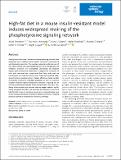High‐fat diet in a mouse insulin‐resistant model induces widespread rewiring of the phosphotyrosine signaling network
Author(s)
Dittmann, Antje; Soltero, Nina L.; Morshed, Nader; Mana, Mana; Yilmaz, Omer H.; White, Forest M.; ... Show more Show less
DownloadPublished version (2.886Mb)
Publisher with Creative Commons License
Publisher with Creative Commons License
Creative Commons Attribution
Terms of use
Metadata
Show full item recordAbstract
Obesity-associated type 2 diabetes and accompanying diseases have developed into a leading human health risk across industrialized and developing countries. The complex molecular underpinnings of how lipid overload and lipid metabolites lead to the deregulation of metabolic processes are incompletely understood. We assessed hepatic post-translational alterations in response to treatment of cells with saturated and unsaturated free fatty acids and the consumption of a high-fat diet by mice. These data revealed widespread tyrosine phosphorylation changes affecting a large number of enzymes involved in metabolic processes as well as canonical receptor-mediated signal transduction networks. Targeting two of the most prominently affected molecular features in our data, SRC-family kinase activity and elevated reactive oxygen species, significantly abrogated the effects of saturated fat exposure in vitro and high-fat diet in vivo. In summary, we present a comprehensive view of diet-induced alterations of tyrosine signaling networks, including proteins involved in fundamental metabolic pathways.
Date issued
2019-08Department
Massachusetts Institute of Technology. Department of Biological Engineering; Koch Institute for Integrative Cancer Research at MITJournal
Molecular Systems Biology
Publisher
EMBO
Citation
Dittmann, Antje et al. "High‐fat diet in a mouse insulin‐resistant model induces widespread rewiring of the phosphotyrosine signaling network." Molecular Systems Biology 15 (2019): e8849 © 2019 The Author(s)
Version: Final published version
ISSN
1744-4292
1744-4292
Keywords
General Biochemistry, Genetics and Molecular Biology, Computational Theory and Mathematics, General Immunology and Microbiology, Applied Mathematics, General Agricultural and Biological Sciences, Information Systems